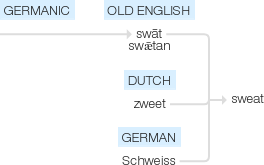Sweat
Old English swāt (noun), swǣtan (verb), of Germanic origin; related to Dutch zweet and German Schweiss, from an Indo-European root shared by Latin sudor .
wiktionary
From Middle English swete, swet, swate, swote, from Old English swāt, from Proto-Germanic *swait-, *swaitą, from Proto-Indo-European *swoyd-(“to sweat”), o-grade of *sweyd-(“to sweat”). Cognate with West Frisian swit, Dutch zweet, German Schweiß, Danish sved, Swedish svett, Yiddish שוויצן (shvitsn) (English shvitz), Latin sudor, French sueur, Italian sudore, Spanish sudor, Persian خوید (xwēd, “moist, fresh”), Sanskrit स्वेद(svéda), Lithuanian sviedri, Tocharian B syā-, and Albanian djersë.
From Middle English sweten, from Old English swǣtan, from Proto-Germanic *swaitijaną(“to sweat”). Compare Dutch zweten, German schwitzen, Danish svede. Doublet of shvitz.
etymonline
sweat (v.)
Old English swætan "perspire," also "work hard," from Proto-Germanic *swaitjan "to sweat," from the source of sweat (n.). Compare Frisian swette, Dutch zweeten, Danish svede, German schwitzen. Meaning "to be worried, vexed" is recorded from c. 1400. Transitive sense is from late 14c. Related: Sweated; sweating. Sweating sickness was a sudden, often-fatal fever, accompanied by intense sweating, that struck England 1485 and returned periodically through mid-16c., described in the original citation (a chronicle from 1502) as "a grete deth and hasty."
sweat (n.)
Old English swat "perspiration, moisture exuded from the skin," also "labor, that which causes sweat," from Proto-Germanic *swaitaz "sweat" (source also of Old Saxon, Old Frisian swet, Old Norse sveiti, Danish sved "sweat," Swedish svett, Middle Dutch sweet, Dutch zweet, Old High German sweiz, German Schweiß), from PIE *sweid- (2) "to sweat" (source also of Sanskrit svedah "sweat," Avestan xvaeda- "sweat," Greek hidros "sweat, perspiration," Latin sudor, Lettish swiedri, Welsh chwys "sweat").
A widespread set of Slavic words (Polish, Russian pot "sweat") is from Old Church Slavonic potu, related to peku "heat," cognate with Latin coquere.
The Old English noun became Middle English swote, but later altered to the current form under the influence of the verb. Sweat of (one's) brow as a symbol of toil is from Genesis iii.19. Sweat equity is from 1968. Colloquial no sweat "no problem" is attested by 1953, said to be originally U.S. military jargon from the Korean War.
The universal and all-inclusive word today is "sweat." It covers just about everything: "no sweat" means no trouble, no cause for worry, nothing fouled up, don't fret. "It's a sweat" means a patrol looks tough, or an order to dig some more trench is an outrage, or simply that everything is messed up as usual. ["A Frontline Picture No Camera Could Get," Life magazine, March 16, 1953]
